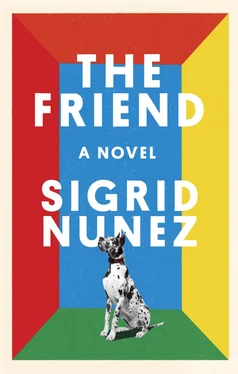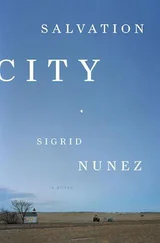• • •
All that anger, says the therapist. Yet none directed at you . No anger, no blame. Is this because I think suicide can be justifiable?
Plato thought so. Seneca thought so.
But what do I think? Why do I think you did it?
Because you were trapped upside down in a tankful of water.
Because you were weak and in pain.
Because you were tired of fighting.
• • •
Once, I spend most of the hour not saying anything. Each time I start to speak I break down. After a few tries, I give up and sit there sobbing until it’s time to go.
I wanted to talk about the time you and I met up in Berlin. I’d been living there that year, on a fellowship. You were passing through: the German translation of your latest book had just been published. So we had a long weekend together.
You wanted to visit the grave site of the writer Heinrich von Kleist, the very place where, in 1811, at the age of thirty-four, he shot himself. I knew the story. How Kleist, who suffered all his life from despair, had for a long time wanted to die. But not alone. The idea of a suicide pact had always turned him on. His dream lover: a woman whose heart’s desire would be to die with him.
Henriette Vogel was not the first woman he approached, but it was she who, diagnosed with terminal cancer at the age of thirty-one, rapturously accepted his proposal of a romantic murder-suicide.
After shooting her in the left breast, Kleist shot himself in the mouth. The man’s job.
Both appear to have expected the experience to be an orgasmic one.
A witness reported having seen them the night before, relaxed and dining in merry spirits. And although the two were Christians, they appear also to have expected that death would transport them to a better world, an eternity of bliss among angels—no fears of the eternal torture said to await equally the violent against others and the violent against themselves.
Vogel, who was married, asked in a last letter to her husband not to be separated from Kleist in death. They were buried where they fell, a shady green slope on the lake known as the Kleiner Wannsee.
Like many burial grounds, this one was peaceful. I would return to it often by myself. (The site has since been renovated, but I’ve never been back.) Almost always I found a fresh flower resting on Kleist’s tombstone, even in winter. I had loved his work ever since reading it for the first time in college, and it pleased me to be at his resting place. To think of the Brothers Grimm walking there. Rilke on the very spot, writing verses in his notebook.
Crossing the Wannsee bridge that day, we saw two swans mating. Not the graceful sight one might have thought—the female looked in serious danger of being drowned. In any case, it was hard to imagine their comical flapping efforts succeeding.
But not long after, on a walkway under the bridge, I found their nest, surprisingly close to shore. Here, too, I would often return. Usually, I’d find one—the female, I assumed—either curled sleeping or sitting on the nest, while the other floated nearby. Sometimes I watched them working together, enlarging the nest with twigs and rushes until it resembled a giant Mexican hat.
It is common knowledge that swans mate for life. A less well-known fact is that they sometimes cheat. I myself discovered that one of this pair—the male, I assumed—habitually visited another swan, in a different part of the lake.
Though I never saw any eggs in the nest, I was hoping in due time to see some cygnets. But then one day the nest was gone. I have no idea what happened to it. The swans began building a new nest, but before long it too vanished.
The swans in Wannsee often appeared toward the end of the day, their feathers taking on the changing colors of the sunset. Rose-tinted swans, swans as pink as flamingos, as blue as violets, swans the deep purple of twilight, night swans. Birds out of a dream, a reminder of the beauty of the world. Of heaven.
He must have been a monster, we agreed. Using his poetic powers to talk a meek, incurably sick woman into letting herself be shot.
But what about her? She was dying anyway. Suicide by proxy, while hastening her death, almost certainly spared her much suffering. But enabling another person to commit murder and self-murder—in this case someone who, though in despair, was still young, and who might have lived and continued to create literature of genius for many more years—how justify that?
If Kleist had never found a death buddy—if, like others before her, this woman had refused his mad request—who knows what might have happened? Or not happened. In fact, the more I think about it, the more it seems to me that Madame Vogel has a lot to answer for. What kind of love was this? Did it not even occur to her to try and save him?
• • •
Now wondering why I wrote “Of heaven” when I don’t believe such a place exists.
• • •
For those who don’t want to go it alone, the internet is a godsend. Perfect strangers, sometimes living far apart, find each other online and arrange a date. A man from Norway flies to New Zealand where he and another man jump from a cliff. A man and a woman book separate rooms at a lakeside resort and are later found handcuffed and drowned together. In Japan, where the trend for group suicide is especially strong, carloads of corpses keep turning up. But the favorite suicide site in Japan remains the famous Aokigahara Forest, at the foot of Mount Fuji, where neither trail signs saying things like You are not alone and Think of your parents nor phones connected to hotlines have succeeded in ousting it from its place as one of the top suicide destinations in the world. Vying with the Golden Gate Bridge, number one spot in the US.
• • •
Berlin. I remember you were in excellent spirits. In one of those flukes of publishing (which, according to you, was now mostly flukes), your book, which had sold poorly back home, was a bestseller in Europe. So you were given the royal treatment on that tour. You were delighted to be in Germany, known for its serious readers (as you kept saying), and particularly in Berlin, one of your favorite cities, like Paris an ideal walking city, rich in the tradition of flânerie.
I remember how happy I was when I heard you were coming. I’d been missing you a lot. And, partly because this was one of those rare times when you were single, and partly because we were far from home—visitors abroad who were often assumed, naturally enough, to be husband and wife—it sometimes felt as if that’s what we were: a couple. A couple on vacation. At any rate, I remember feeling especially close to you that weekend and sadly bereft when you left.
• • •
All of this is branded in memory and was much on my mind as I sat in the therapist’s office. But I could not talk about it because I could not stop crying.
• • •
Now asking myself why, in spite of reflection, I let “Of heaven” stand.
• • •
He thinks I’m in love with you. He thinks I’ve always been in love with you. This he tells me in a voice that’s different from his usual gentle one, not exactly ungentle but a touch impatient if I’m not mistaken. Or maybe just urgent.
This complicates the bereavement process, he explains. I am mourning you as a lover would. As a wife would.
Maybe it will help you to write about it, he says the last time I see him.
And maybe it won’t.
• • •
I had forgotten how painful it is to remember, writes one of my students. And she is only eighteen years old.
Читать дальше












